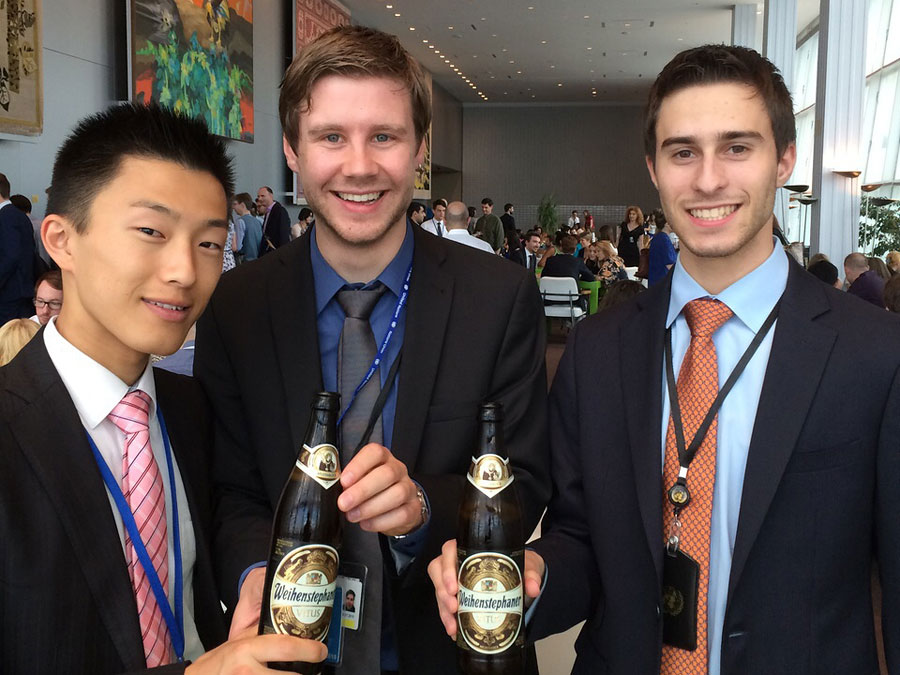UN youth delegate Rupert Heindl in New York:
“With a little effort by everyone, a lot can be achieved!”

Rupert, what are your impressions of New York?
There were actually quite a lot of new impressions, also because of the town itself. Obviously, the UN apparatus is really impressive, due to its complexity and the fact that so many countries are involved. It took me a while to get accustomed.
What are your positive impressions?
Concerning specific topics, the UN has achieved more than ever before – at least that’s the way I see it – and that’s really important for global societal changes, especially in terms of sustainability.
What about the more negative aspects?
In America, there is still a lot of room for improvement regarding sustainability. Everything is wrapped up in plastic bags four times … and even the UN-cafeteria had only plastic dinnerware, which caused a lot of criticism. Those who are responsible are planning to change that.
What were your main duties?
In the scope of the negotiations, we mainly did lobbying work and tried to draw attention to our concerns. Other things that were important for us were networking and trying to establish sustainable structures for youth participation.
Can you briefly summarize your main concerns?
An important aspect is that young people should have more to say in parliamentary decision-making processes. Almost 50% of the world population are aged 30 years and younger. In order to implement the sustainability agenda, our generation has to accept it too. To achieve this, young people must be systematically included in the processes.
You are probably also concerned about climate change.
Of course! In our opinion, it is important to take sustainable measures to meet the climate targets. Future economic development should no longer be in conflict with environmental protection and human rights.
How many specific goals does the UN-Commission have?
Currently, there are 17 goals that can be broken down to 169 targets. They will not be officially decided on until September, when all the important politicians and the media are there. It will probably be quite an event. Unfortunately, it is not yet sure whether the youth delegates will be there too.
How are the goals assessed?
As of next year, the High Level Political Forum will assess whether the goals are being implemented. Whether – or to what extent – they can be implemented depends on how objectively the processes are reviewed. Therefore, experts are currently working on several hundred indicators to ensure an objective and scientifically substantiated assessment. Goals must be measurable.
Did you have a little free time to look around you in New York?
Yes. In our free time, we were able to see quite a lot. For example, Central Park is very important for me. We also visited many art museums. We celebrated Independence Day with a group of students and other locals at a rooftop party in Brooklyn. We met up with the other youth delegates a lot, but also with locals. That was great.
What impressed you most?
I was impressed by a lot of different things – but most of all probably by meeting Rolf-Dieter Heuer, who is head of CERN (the European Organization for Nuclear Research in Geneva / Switzerland). I managed to get hold of him at the margins of the negotiations. For me, as a student of natural science, that was really something!
What are your wishes for the future?
One of the representatives said that it could be seen as a success that the number of starving children is on the decline – but that, on the other hand, the fact that there are still millions of children who starve to death every year is not due to problems with the infrastructure, but due to a lack of political will. We will have to hope for the best – and, of course, a lot depends on us.
What can we do?
I’m not saying that everyone has to become a vegan overnight. However, a lot could be achieved if everyone would keep things like that in mind when making political decisions in everyday life. We must keep an eye on politics to ensure that the goals are implemented, but we must act accordingly ourselves as well!
What do you mean by political decisions?
What I mean is, for example, purchasing decisions … but also, and especially, voting in elections or discussing sustainability in our private sphere. You should also question what’s going on at your university. Most lecturers are happy to answer critical questions. In my opinion, one’s individual lifestyle is most important, because it has a lot more impact than all the big talk. Of course, that doesn’t work from one moment to the next – but with a little effort by everyone, a lot can be achieved.
(Interview: Verena Pongratz)
Rupert Heindl (26) is currently studying at the TUM School of Education. His major course of study is Metal Engineering, the minor is Theology. The Automotive Mechatronics Engineer is originally from Kirchdorf in the district of Mühldorf. Every year, the German federal government sends two young people to New York to join the UN Commission on Sustainable Development. His term ends in November 2016.
More information:
Contact Rupert Heindl: r.heindl@tum.de
Youth Delegates for Sustainable Development on facebook